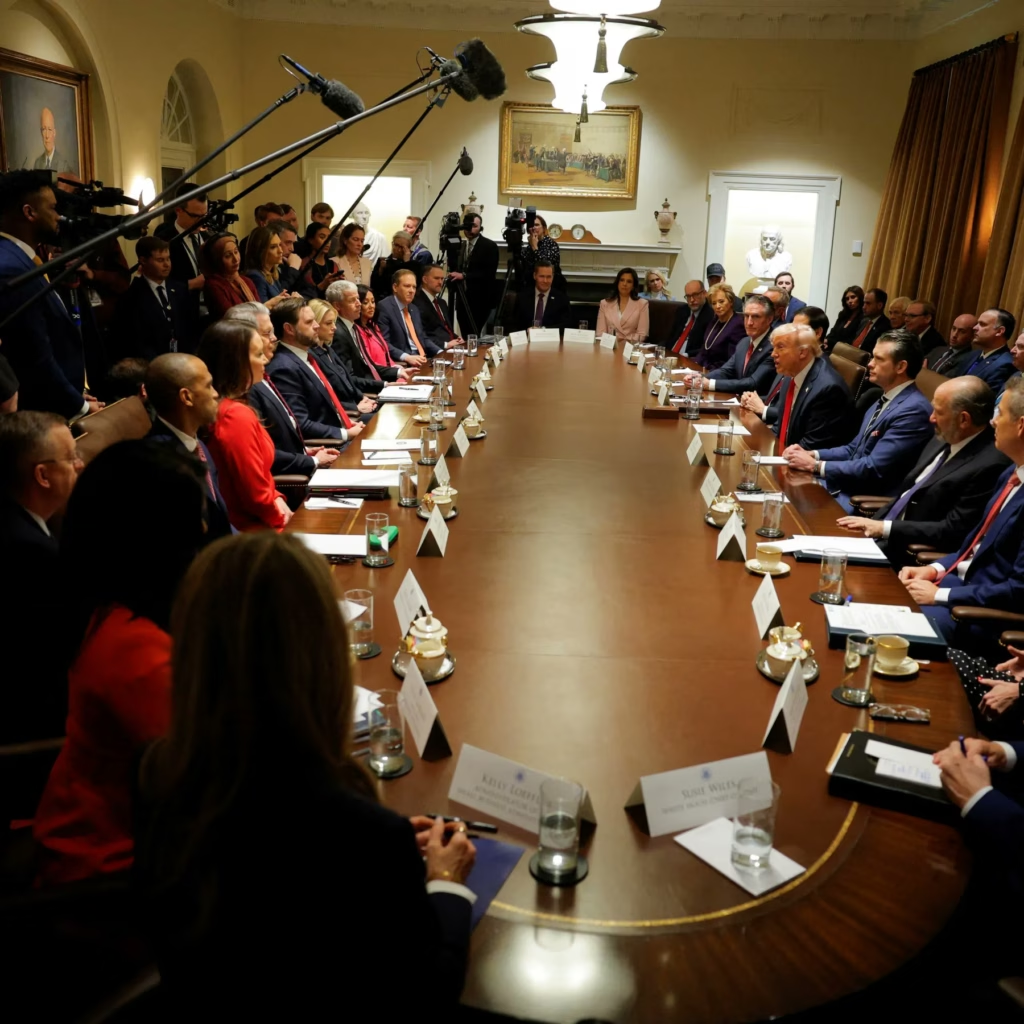Washington, D.C. – President Donald Trump hosted a significant cabinet meeting at the White House today, where top officials delivered a series of major policy announcements aimed at reshaping trade, immigration, education, and government efficiency. The meeting, broadcast live and attended by numerous cabinet members, underscored the administration’s focus on economic protectionism, border security, and reducing federal spending.
Economic and Trade Initiatives
President Trump opened the meeting by highlighting economic gains, stating that consumer prices and energy costs are dropping, while the U.S. is earning $2 billion daily from tariffs. “We’re fixing trade deals that should’ve been addressed decades ago. America is finally demanding respect,” Trump declared. Commerce Secretary Howard Lutnick added that over 75 countries are now negotiating trade deals following recent tariff announcements. A new “Gold Card” visa program was also introduced, set to launch within a week, offering wealthy foreigners a pathway to U.S. citizenship for a $5 million investment, replacing the controversial EB-5 visa program.
Defense and Global Influence
Defense Secretary Pete Hegseth announced new agreements to secure the Panama Canal with U.S. military presence, aiming to counter Chinese influence in the region. Troops will return to former bases, reversing what Hegseth described as a growth of foreign influence under previous administrations. Meanwhile, State Secretary Marco Rubio revealed that peace talks with Iran are scheduled for Saturday, alongside a crackdown on student visas, with Rubio emphasizing, “No one has a right to a student visa.”
Education and Federal Funding
Education Secretary Linda McMahon announced the withholding of $400 million in federal funding from Columbia University and $8 billion from Harvard University, citing concerns over anti-Semitism on campuses. McMahon also plans to meet with governors to return education control to states, aligning with the administration’s goal of reducing federal oversight in education.
Immigration and Border Security
The Department of Homeland Security (DHS), led by Secretary Kristi Noem, reported a second consecutive month of record-low border crossings. Noem outlined a new self-deportation program with a legal return pathway, including special provisions for farm workers. Additionally, Small Business Administration (SBA) Administrator Kelly Loeffler modified loan applications to require citizenship verification, reinstating $450 million in fees previously waived under the Biden administration.
Government Efficiency and Fraud Detection
Elon Musk, tasked with leading the Department of Government Efficiency, identified $150 billion in government waste, while the Labor Department, under Secretary Lori Chavez-DeRemer, uncovered $400 million in fraudulent unemployment payments. Shockingly, funds were disbursed to 25,000 “people” over 115 years old and 10,000 not yet born, prompting the return of billions to the Treasury.
Environmental and Infrastructure Reforms
EPA Administrator Lee Zeldin announced the cancellation of $22 billion in grants, launching what he called the “largest deregulatory action in history” to lower home heating costs, make cars affordable, and approve new power plants. Transport Secretary Sean Duffy emphasized rebuilding the U.S. shipbuilding industry and stripping “green” and “social justice” requirements from infrastructure projects to focus on roads and bridges. Interior Secretary Doug Burgum also revealed new land and offshore leases to “unleash American energy,” with the first lease sold in what he termed “The Gulf of America.”
Health, Agriculture, and Transparency
Health and Human Services Secretary Robert F. Kennedy Jr. outlined initiatives including reassessing fluoride due to IQ impact research, removing soda from food stamps, and reducing animal testing in favor of AI. Agriculture Secretary Brooke Rollins, working with Kennedy, plans to revamp the USDA’s food stamp program by removing “DEI elements” and supporting farmers with tariffs to offset 30% cost increases. Director of National Intelligence Tulsi Gabbard announced the imminent release of previously unseen documents related to the assassinations of Robert F. Kennedy and Martin Luther King Jr., fulfilling a Trump executive order to declassify such files.
Law Enforcement and Accountability
Attorney General Pam Bondi reported that courts are siding with the administration on spending discretion, with 11 defendants charged for possessing $11 billion in cocaine. Bondi also vowed to prosecute “Tesla terrorists” with no negotiations, promising 20-year sentences. Treasury Secretary Scott Bessent highlighted successful debt ceiling negotiations and a shift in focus from Wall Street to Main Street, managing trade discussions with over 75 countries.
Public Reaction and Context
The announcements come amid a broader push for transparency, as noted by White House Press Secretary Karoline Leavitt in a separate briefing today, where she began with a prayer and reported that President Trump has answered nearly 100 questions from the press in his first three open cabinet meetings of 2025—a stark contrast to his predecessor. The administration’s actions, however, have sparked debate, with critics questioning the use of federal funding to pressure universities and the potential implications of the Gold Card program on immigration policy.
As these policies roll out, the Trump administration continues to signal a bold, America-first agenda, with significant implications for both domestic and international affairs. Further details on the Gold Card program and the release of historical documents are expected in the coming days.
